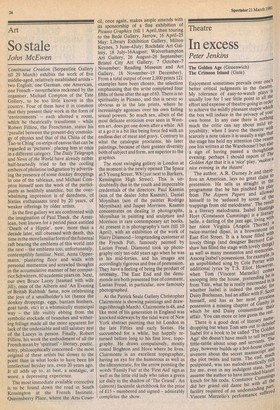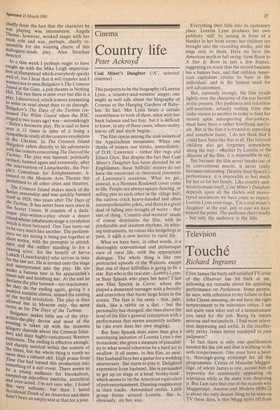Theatre
In excess
Peter Jenkins
The Golden Age (Greenwich) The Crimson Island (Gate) Enjoyment sometimes prevails over one's better critical judgments in the theatre. My tolerance of easy-to-watch plays Is usually low for I see little point in all the effort and expense of theatre-going in order to achieve the mildly pleasant stupor which the box will induce in the privacy of your own home. In any case there is nothing much the critic can say about mild enjoyability; when I leave the theatre with scarcely a note taken it is usually a sign that the stage has held my attention (the reruns one has written at the Warehouse!) but also a sign of having passed a thoughtless evening; perhaps I should report of The Golden Age that it is a 'nice' play, 'makes a nice evening in the theatre'. The author, A.R. Gurney Jr and there' fore an American, lays no great claim t° pretension. He tells us straight in the programme that he has pinched his 1318Y from The Aspern Papers and alloveu himself to be 'seduced by some of the trappings from old melodrama'. The result is a literary melodrama. Isabel Hastings Hoyt (Constance Cummings) is a literarY belle, a darling of the jazz age, living with her niece Virginia (Angela Thorne) a twice-married dipso, in a brownstone F,h East 81st Street. It is a house filled wit," i lovely things (and designer Bernard Culshaw has filled the stage with lovely thngs) Aa mwoenl ig aI ss a mb ea In' sy pmo sesme ses ot on s and for n d emx mm p017; 1St!' an unpublished song by Cole Porter wit" additional lyrics by T.S. Eliot. However' when Tom (Vincent Marzello) conies snooping into the house, pretending he !s from Yale, what he is really interested in IS whether Isabel is indeed the model for Daisy Buchanan, had an affair with F. Sc"tr himself, and has as her most pricele,ss possession a missing chapter of Gatsby which he and Daisy consummate their affair. You can more or less guess the rest. There is a good deal of literary noire; dropping but when Tom sets out to debriet Isabel for a book to be called 'The Goldeed Age' she doesn't have much to tell beY,..,02. tittle-tattle about soup and servants, I": play, however builds up a hot-house obses, siveness about the secret manuscript ant the plot twists and turns. The end, much postponed, was too melodramatically ricu, for me, even in my indulgent state, but 1. assume the author to have intended blatant_ kitsch for his coda. Constance Cumnils did her grand old dame bit with all the .
facility required of an undemanding Par`.; Vincent Marzello's performance suffereu Chiefly from the fact that the character he was playing was inconsistent. Angela Thorne, however, worked magic with her stock role and was, perhaps, chiefly responsible for the winning charm of this mahogany-made play. Alan Strachan directed.
In a thin week I perhaps ought to have caught up with the Mike Leigh improvisation at Hampstead which everybody speaks well of, but I hear that it will transfer and I wanted not to miss Bulgakov's The Crimson Island at the Gate, a pub theatre in Notting Hill. The run there is now over but this is a Play, I discovered, which is more interesting to write or read about than to sit through. Blilgakov's The Days of the Turbins (renamed The White Guard when the RSC staged it two years ago) was — astonishingly — Stalin's favourite play. He is said to have Seen it 15 times in spite of it being a syrnpathetic study of the counter-revolution in the Ukraine. In The Crimson Island Bulgakov refers directly to his adventures With the censors concerning The Days of the Turbins. The play was banned, politically revised, banned again and eventually, after the intervention of Lunacharsky, the People's Commissar for Enlightenment, licenced to the Moscow Arts Theatre but prohibited to all other cities and theatres. The Crimson Island makes mock of the Soviet censorship and was quickly banned Itself in 1928, two years after The Days of the Turbins. It has never been seen since in the Soviet Union. It consists of a dadae, Nue play-within-a-play about a desert island whose inhabitants stage a revolution 'which is soon betrayed. One Tsar turns out to be very much like another. The performance we are seeing is being put together at short notice, with the prompter in attendan.ce and the author standing in for a missing actor, for the benefit of Savva Lukich (Lunacharsky) who arrives in time for the last act. He is invited onto the stage and incorporated into the play. He sits ander a banana tree in his apparatchik's stnart suit and homburg hat. At the end he declares the play banned — too reactionary. So they do the ending again, giving it a positive socialist climax, indeed the coming Of the world revolution. The play is then allowed but in Moscow only, the same terms as for The Days of the Turbins. Bulgakov makes little use of the playwithin-the-play device and most of the evening is taken up with the tiresome allegory charade about the Crimson Islanders and their highly-caricatured Western exploiters, The ending is effective enough, and sharply satirical within the context of the times, but the whole thing is worth no more than a cabaret skit, High praise from Tone Out had turned this production into be of a cult event. There seems to 'be a young audience for knockabout, camped-up schoolboy pastiche, anarchical and over-acted. I'm not sure why; I found this very unfunny, but then I hated A_ cciclental Death of an Anarchist and there hasn t been an empty seat at that for a year.







































 Previous page
Previous page